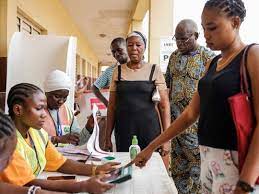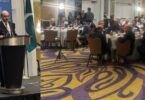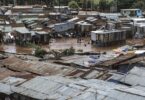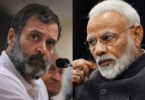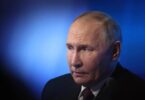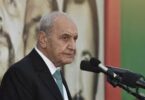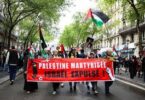LAGOS (AFP): Nigerians voted on Saturday for a successor to President Muhammadu Buhari in a tightly fought race, with three frontrunners competing for the first time in the country’s modern history.
Nearly 90 million people are eligible to vote in the election, which is taking place as Africa’s most populous democracy grapples with a multi-front security crisis, a sluggish economy and widening poverty.
For the first time since the end of military rule in 1999, a third serious candidate has emerged to challenge the dominance of Buhari’s ruling All Progressives Congress (APC) and main opposition Peoples Democratic Party (PDP).
“It’s going to be different this time, we have three people,” said Friday Ikwuako, 55, a school employee voting in the affluent Ikoyi district of Lagos. “We want a change in government.”
Polling stations were meant to open at 0730 GMT, but election officials arrived late in numerous centers in Lagos and in southern Port Harcourt and northwest Kano.
With Buhari stepping down after two terms in office, the APC’s Bola Tinubu, 70, a former Lagos governor and political kingmaker, says “It’s my turn” for the presidency.
He faces a familiar rival — PDP candidate and former vice president Atiku Abubakar, 76, who is on his sixth bid for the top job and touts his business experience to fix the economy.
But the emergence of a surprise third candidate appealing to young voters, Labour Party’s Peter Obi, 61, has thrown the race open with his campaign for change from his old-guard rivals.
“There’s a lot of pressure this year, in the choice. We know how elections go usually and there’s been a lot of promises with this election,” said Osaki Briggs, 25, a photographer voting in Port Harcourt.
“Our expectations are higher. We hope we won’t be disappointed.”
The success of Saturday’s election will be closely watched after West Africa’s democratic credentials took a knock from coups in Burkina Faso and Mali and Islamist militancy spread north of Nigeria’s Gulf of Guinea neighbors.
Megacity Lagos may have put Nigeria on the global entertainment map today for its Nollywood film industry and global Afrobeats stars like Burna Boy, but the new leader of Africa’s largest economy inherits a complex set of security and financial risks.
Cash and fuel shortages in the days before the election have also left many Nigerians angry and struggling more than usual in a country already hit by more than 20 percent inflation.
Presidential elections have in the past often been marked by violence, ethnic tensions, vote-buying and clashes between supporters of rival parties.
Nearly 10 million new voters registered this year, most of them under 34, representing an essential bloc if they come out to vote.
Streets in Lagos and other cities were calm as traffic was restricted. Groups of boys took advantage to hold impromptu football matches in the empty roads.
Voters will also cast their ballot for Nigeria’s two houses of parliament, the National Assembly and Senate. Polls close at 1330 GMT.
The Independent National Electoral Commission (INEC) has given no timeline for results, but votes are expected to be tallied within a few days. Under a 2022 law, the official results have to be confirmed within 14 days.
To win the presidency, a candidate must get the most votes, but also win 25 percent in two-thirds of Nigeria’s 36 states.
If no candidate wins, a runoff will take place within 21 days between the two frontrunners — an unprecedented outcome that some analysts say is a possibility this time around.
“It’s difficult for us to make an easy prediction as to what is going to be the likely outcome,” said Kano State College public affairs lecturer Kabiru Sufi.
The rules reflect a country almost equally split between the mostly Muslim north and predominantly Christian south, and with three main ethnic groups across the regions: Yoruba in the southwest, Hausa/Fulani in the north and Igbo in the southeast.
Voting also often falls along ethnic and religious lines.
This time, Tinubu is a southern Yoruba Muslim, Atiku is an ethnic Fulani Muslim from the northeast, and Peter Obi is a Christian Igbo from the southeast.
Today, most experts see INEC as being more prepared than in 2019. It has introduced biometric voter IDs to help prevent fraud, and results will be transmitted electronically.
Around 400,000 police and troops have been deployed around the country to protect the vote.
But security challenges are vast. Buhari, a former army commander, was elected in 2015 and re-elected in 2019, on promises to make Nigeria safer and less corrupt.
But miiltants operate mostly in the northeast, bandit militias carry out mass kidnappings in rural communities in the northwest, and separatist gunmen are accused of targeting INEC offices and police in the southeast.

